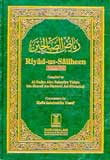Riyad Us-Saliheen (Gardens of the Righteous)

Chapter 168
Etiquette of Staying, Riding, Encamping at night and sleeping during the Journey and other matters relating to the Journey
962. Abu Hurairah (May Allah be pleased with him) reported: The Messenger of Allah (PBUH) said: "When you travel through green and lush land, give the camels their due from the ground, and when you travel through a dry and barren land, make them walk quickly lest their strength falters. When you encamp at night, keep away from the roads, for beasts pass there and they are the resort of insects at night.''
[Muslim].
Commentary: The Prophet (PBUH) commanded us to take care of the animal's food. If grass or fodder will not be available on the way, we should make our animal run faster so as to reach our destination before it is exhausted. There is another instruction for us. In case we happen to stop at night for rest, we should camp away from roads. This will ensure our safety as well as save others from inconvenience.
963. Abu Qatadah (May Allah be pleased with him) reported: When the Messenger of Allah (PBUH) encamped at night during a journey, he would lie down on his right side, and when he stayed a little before dawn he would raise his forearm and place his head on the palm of his hand.
[Muslim].
Commentary: This Hadith tells us that we should be fully regardful of the performance of prayer, particularly during a journey. We must make sure we perform prayer at the right time.
964. Anas (May Allah be pleased with him) reported: The Messenger of Allah (PBUH) said, "Keep to travelling by night because the earth is folded (traversed more easily) during the night.''
[Abu Dawud].
Commentary: According to this Hadith, we should preferably travel at night, particularly late at night. After having slept in the first part of night, one feels invigorated and fresh enough to restart one's journey.
965. Abu Tha`labah Al-Khushani (May Allah be pleased with him) reported: Whenever the people encamped during the journey, they would disperse in the mountain passes and valleys. (When) the Messenger of Allah (PBUH) noticed this he said, "Your act of scattering in the mountain passes and valleys is from Satan.'' Afterwards the Companions kept close together whenever they encamped.
[Abu Dawud].
Commentary: This Hadith teaches us not to encamp during a journey but in the company of others in order to create an atmosphere of intimacy and cooperation.
966. Sahl bin `Amr known as Ibn Al-Hanzaliyyah reported: The Messenger of Allah (PBUH) happened to pass by a camel whose belly was sticking to its back (because of hunger), whereupon he said, "Fear Allah in respect of these dumb (animals). Ride them while they are fit, and slaughter them and eat their meat when they are fit.''
[Abu Dawud].
Commentary: This Hadith lays emphasis on taking care of animals. Because if they are hungry or you overload them, they will not be able to speak out their suffering to you in human language. You are, therefore, supposed to take care of their food and other requirements by yourself. In case you fail in your duty to them, Allah will take you to task. Moreover, eating the flesh of sick and lean animals is unhygienic and can endanger health. Whereas, the flesh of a healthy and robust animal gives energy and strength to human body.
967. Abu Ja`far `Abdullah bin Ja`far (May Allah be pleased with them) reported: The Messenger of Allah (PBUH) made me ride behind him one day and confided something to me which I shall never disclose to anyone. (`Abdullah added:) He ((PBUH) preferred to screen himself from others when responding to the call of nature, either behind a wall or the trunk of a date-palm.
[Muslim].
Al-Barqani added: The Messenger of Allah (PBUH) entered an orchid belonging to an Ansari and saw there a camel. When it saw him, it began to groan and its eyes shed tears. The Messenger of Allah (PBUH) approached it and patted it on the hump and the base of its head until it quieted down. Then he (PBUH) asked, "Who is the owner of this camel? To whom does it belong?'' An Ansari youth stepped forward and said: "It is mine O Messenger of Allah!'' He said, "Do you not fear Allah in respect of this beast which Allah has placed in your possession? This camel is complaining to me that you starve it and put it to toil.''
[Abu Dawud].
Commentary: The Prophet (PBUH) must have divulged to the Companion something confidential for which he promised secrecy. Otherwise, anything concerning the Shari`ah should not be concealed. Second, if an animal has the capacity to carry two men, the rider can let another person sit behind him. Third, to give scanty food to an animal and to get the maximum out of it amounts to injustice. Islam disapproves this act. Animals should be fed to their fill and the amount of work to be done by them must also be not beyond their capacity. In this Hadith, there is a mention of the Prophet's miracle that a camel recognized him. He heard the camel's complaint and also understood it.
968. Anas (May Allah be pleased with him) reported: When we encamped, we would not offer (voluntary) prayers until we had unsaddled our beasts.
[Abu Dawud].
Commentary: It was the usual practice of the Companions that whenever they halted at some place to take rest during their journey, they would first of all unload their animals to give them comfort and relaxation. Then, they would perform voluntary Salat. This Hadith also throws light on the excellence of voluntary Salat in a journey.
